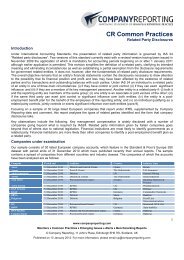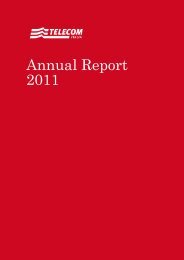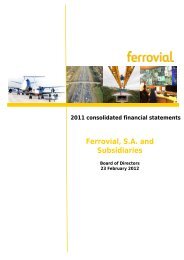Business review<strong>Report</strong>ing – failure to accurately report our data could lead toregulatory action, legal liability <strong>and</strong> reputational damage.External reporting of financial <strong>and</strong> non-financial data is reliant on theintegrity of systems <strong>and</strong> people. Failure to report data accurately <strong>and</strong> incompliance with external st<strong>and</strong>ards could result in regulatory action, legalliability <strong>and</strong> damage to our reputation.Safety <strong>and</strong> operational risksThe risks inherent in our operations include a number of hazards that,although many may have a low probability of occurrence, can haveextremely serious consequences if they do occur, such as the Gulf ofMexico oil spill. The occurrence of any such risks could have a consequentmaterial adverse impact on the group’s business, competitive position,cash flows, results of operations, financial position, prospects, liquidity,shareholder returns <strong>and</strong>/or implementation of the group’s strategic goals.Process safety, personal safety <strong>and</strong> environmental risks – the natureof our operations exposes us to a wide range of significant health,safety, security <strong>and</strong> environmental risks, the occurrence of whichcould result in regulatory action, legal liability <strong>and</strong> increased costs<strong>and</strong> damage to our reputation.The nature of the group’s operations exposes us to a wide range ofsignificant health, safety, security <strong>and</strong> environmental risks. The scope ofthese risks is influenced by the geographic range, operational diversity<strong>and</strong> technical complexity of our activities. In addition, in many of our majorprojects <strong>and</strong> operations, risk allocation <strong>and</strong> management is shared withthird parties, such as contractors, sub-contractors, joint venture partners<strong>and</strong> associates. See ‘Joint ventures <strong>and</strong> other contractual arrangements– <strong>BP</strong> may not have full operational control <strong>and</strong> may have exposure tocounterparty credit risk <strong>and</strong> disruptions to our operations <strong>and</strong> strategicobjectives due to the nature of some of its business relationships’ onpage 63.There are risks of technical integrity failure as well as risk of naturaldisasters <strong>and</strong> other adverse conditions in many of the areas in which weoperate, which could lead to loss of containment of hydrocarbons <strong>and</strong>other hazardous material, as well as the risk of fires, explosions or otherincidents.In addition, inability to provide safe environments for our workforce<strong>and</strong> the public could lead to injuries or loss of life <strong>and</strong> could result inregulatory action, legal liability <strong>and</strong> damage to our reputation.Our operations are often conducted in difficult or environmentallysensitive locations, in which the consequences of a spill, explosion,fire or other incident could be greater than in other locations. Theseoperations are subject to various environmental <strong>and</strong> safety laws,regulations <strong>and</strong> permits <strong>and</strong> the consequences of failure to complywith these requirements can include remediation obligations, penalties,loss of operating permits <strong>and</strong> other sanctions. Accordingly, inherent inour operations is the risk that if we fail to abide by environmental <strong>and</strong>safety <strong>and</strong> protection st<strong>and</strong>ards, such failure could lead to damage to theenvironment <strong>and</strong> could result in regulatory action, legal liability, materialcosts, damage to our reputation or denial of our licence to operate.To help address health, safety, security, environmental <strong>and</strong>operations risks, <strong>and</strong> to provide a consistent framework within whichthe group can analyse the performance of its activities <strong>and</strong> identify<strong>and</strong> remediate shortfalls, <strong>BP</strong> has introduced a group-wide operatingmanagement system (OMS). Work on the application of OMS in individualoperating businesses continues <strong>and</strong> following the Gulf of Mexico oil spillan enhanced safety <strong>and</strong> operational risk (S&OR) function was established,reporting directly to the group chief executive. There can be no assurancethat OMS will adequately identify all process safety, personal safety <strong>and</strong>environmental risk or provide the correct mitigations, or that all operationswill be in conformance with OMS at all times.Security – hostile activities against our staff <strong>and</strong> activities couldcause harm to people <strong>and</strong> disrupt our operations.Security threats require continuous oversight <strong>and</strong> control. Acts of terrorism,piracy, sabotage, cyber-attacks <strong>and</strong> similar activities directed against ouroperations <strong>and</strong> offices, pipelines, transportation or computer systems couldcause harm to people <strong>and</strong> could severely disrupt business <strong>and</strong> operations.Our business activities could also be severely disrupted by civil strife <strong>and</strong>political unrest in areas where we operate.Product quality – failure to meet product quality st<strong>and</strong>ards could leadto harm to people <strong>and</strong> the environment <strong>and</strong> loss of customers.Supplying customers with on-specification products is critical tomaintaining our licence to operate <strong>and</strong> our reputation in the marketplace.Failure to meet product quality st<strong>and</strong>ards throughout the value chain couldlead to harm to people <strong>and</strong> the environment <strong>and</strong> loss of customers.Drilling <strong>and</strong> production – these activities require high levelsof investment <strong>and</strong> are subject to natural hazards <strong>and</strong> otheruncertainties. Activities in challenging environments heighten manyof the drilling <strong>and</strong> production risks including those of integrityfailures, which could lead to curtailment, delay or cancellationof drilling operations, or inadequate returns from explorationexpenditure.Exploration <strong>and</strong> production require high levels of investment <strong>and</strong> aresubject to natural hazards <strong>and</strong> other uncertainties, including those relatingto the physical characteristics of an oil or natural gas field. Our exploration<strong>and</strong> production activities are often conducted in extremely challengingenvironments, which heighten the risks of technical integrity failure <strong>and</strong>natural disasters discussed above. The cost of drilling, completing oroperating wells is often uncertain. We may be required to curtail, delayor cancel drilling operations because of a variety of factors, includingunexpected drilling conditions, pressure or irregularities in geologicalformations, equipment failures or accidents, adverse weather conditions<strong>and</strong> compliance with governmental requirements. In addition, explorationexpenditure may not yield adequate returns, for example in the case ofunproductive wells or discoveries that prove uneconomic to develop.The Gulf of Mexico oil spill illustrates the risks we face in our drilling <strong>and</strong>production activities.Transportation – all modes of transportation of hydrocarbons involveinherent <strong>and</strong> significant risks.All modes of transportation of hydrocarbons involve inherent risks. Anexplosion or fire or loss of containment of hydrocarbons or other hazardousmaterial could occur during transportation by road, rail, sea or pipeline. Thisis a significant risk due to the potential impact of a release on people <strong>and</strong>the environment <strong>and</strong> given the high volumes potentially involved.Major project delivery – our group plan depends upon successfuldelivery of major projects, <strong>and</strong> failure to deliver major projectssuccessfully could adversely affect our financial performance.Successful execution of our group plan depends critically on implementingthe activities to deliver the major projects over the plan period. Poordelivery of any major project that underpins production or productiongrowth, including maintenance turnaround programmes, <strong>and</strong>/or a majorprogramme designed to enhance shareholder value could adversely affectour financial performance. Successful project delivery requires, amongother things, adequate engineering <strong>and</strong> other capabilities <strong>and</strong> thereforesuccessful recruitment <strong>and</strong> development of staff is central to our plans.See ‘People <strong>and</strong> capability – successful recruitment <strong>and</strong> development ofstaff is central to our plans’ on page 63.Digital infrastructure is an important part of maintaining ouroperations, <strong>and</strong> a breach of our digital security could result in seriousdamage to business operations, personal injury, damage to assets,harm to the environment, breaches of regulations, litigation, legalliabilities <strong>and</strong> reparation costs.The reliability <strong>and</strong> security of our digital infrastructure are critical tomaintaining the availability of our business applications, including thereliable operation of technology in our various business operations <strong>and</strong>the collection <strong>and</strong> processing of financial <strong>and</strong> operational data, as well asthe confidentiality of certain third-party information. A breach of our digitalsecurity, either due to intentional actions or due to negligence, could causeserious damage to business operations <strong>and</strong>, in some circumstances, couldresult in injury to people, damage to assets, harm to the environment,breaches of regulations, litigation, legal liabilities <strong>and</strong> reparation costs.62 <strong>BP</strong> <strong>Annual</strong> <strong>Report</strong> <strong>and</strong> <strong>Form</strong> <strong>20</strong>-F <strong>20</strong>11
Business reviewBusiness continuity <strong>and</strong> disaster recovery – the group must be ableto recover quickly <strong>and</strong> effectively from any disruption or incident, asfailure to do so could adversely affect our business <strong>and</strong> operations.Contingency plans are required to continue or recover operations followinga disruption or incident. Inability to restore or replace critical capacity to anagreed level within an agreed timeframe would prolong the impact of anydisruption <strong>and</strong> could severely affect our business <strong>and</strong> operations.Crisis management – crisis management plans are essential torespond effectively to emergencies <strong>and</strong> to avoid a potentially severedisruption in our business <strong>and</strong> operations.Crisis management plans <strong>and</strong> capability are essential to deal withemergencies at every level of our operations. If we do not respond, or areperceived not to respond, in an appropriate manner to either an external orinternal crisis, our business <strong>and</strong> operations could be severely disrupted.People <strong>and</strong> capability – successful recruitment <strong>and</strong> development ofstaff is central to our plans.Successful recruitment of new staff, employee training, development<strong>and</strong> long-term renewal of skills, in particular technical capabilities suchas petroleum engineers <strong>and</strong> scientists, are key to implementing ourplans. Inability to develop human capacity <strong>and</strong> capability, both acrossthe organization <strong>and</strong> in specific operating locations, could jeopardizeperformance delivery.In addition, significant management focus is required in respondingto the Gulf of Mexico oil spill Incident. Although <strong>BP</strong> set up the Gulf CoastRestoration Organization to manage the group’s long-term response, keymanagement <strong>and</strong> operating personnel will need to continue to devotesubstantial attention to responding to the Incident <strong>and</strong> to address theassociated consequences for the group. The group relies on recruiting<strong>and</strong> retaining high-quality employees to execute its strategic plans <strong>and</strong>to operate its business. The Incident response has placed significantdem<strong>and</strong>s on our employees, <strong>and</strong> the reputational damage suffered by thegroup as a result of the Incident <strong>and</strong> any consequent adverse impact on ourperformance could affect employee recruitment <strong>and</strong> retention.Treasury <strong>and</strong> trading activities – control of these activities dependson our ability to process, manage <strong>and</strong> monitor a large number oftransactions. Failure to do this effectively could lead to businessdisruption, financial loss, regulatory intervention or damage to ourreputation.In the normal course of business, we are subject to operational risk aroundour treasury <strong>and</strong> trading activities. Control of these activities is highlydependent on our ability to process, manage <strong>and</strong> monitor a large number ofcomplex transactions across many markets <strong>and</strong> currencies. Shortcomingsor failures in our systems, risk management methodology, internal controlprocesses or people could lead to disruption of our business, financial loss,regulatory intervention or damage to our reputation.Following the Gulf of Mexico oil spill, Moody’s Investors Service,St<strong>and</strong>ard <strong>and</strong> Poor’s <strong>and</strong> Fitch Ratings downgraded the group’s long-termcredit ratings. Since that time, the group’s credit ratings have improvedsomewhat but are still lower than they were immediately before the Gulfof Mexico oil spill. The impact that a significant operational incident canhave on the group’s credit ratings, taken together with the reputationalconsequences of any such incident, the ratings <strong>and</strong> assessments publishedby analysts <strong>and</strong> investors’ concerns about the group’s costs arising fromany such incident, ongoing contingencies, liquidity, financial performance<strong>and</strong> volatile credit spreads, could increase the group’s financing costs <strong>and</strong>limit the group’s access to financing. The group’s ability to engage in itstrading activities could also be impacted due to counterparty concernsabout the group’s financial <strong>and</strong> business risk profile in such circumstances.Such counterparties could require that the group provide collateral orother forms of financial security for its obligations, particularly if thegroup’s credit ratings are downgraded. Certain counterparties for thegroup’s non-trading businesses could also require that the group providecollateral for certain of its contractual obligations, particularly if the group’scredit ratings were downgraded below investment grade or where acounterparty had concerns about the group’s financial <strong>and</strong> business riskprofile following a significant operational incident. In addition, <strong>BP</strong> may beunable to make a drawdown under certain of its committed borrowingfacilities in the event we are aware that there are pending or threatenedlegal, arbitration or administrative proceedings which, if determinedadversely, might reasonably be expected to have a material adverse effecton our ability to meet the payment obligations under any of these facilities.Credit rating downgrades could trigger a requirement for the company toreview its funding arrangements with the <strong>BP</strong> pension trustees. Extendedconstraints on the group’s ability to obtain financing <strong>and</strong> to engage in itstrading activities on acceptable terms (or at all) would put pressure on thegroup’s liquidity. In addition, this could occur at a time when cash flowsfrom our business operations would be constrained following a significantoperational incident, <strong>and</strong> the group could be required to reduce plannedcapital expenditures <strong>and</strong>/or increase asset disposals in order to provideadditional liquidity, as the group did following the Gulf of Mexico oil spill.Joint ventures <strong>and</strong> other contractual arrangements – <strong>BP</strong> may nothave full operational control <strong>and</strong> may have exposure to counterpartycredit risk <strong>and</strong> disruptions to our operations <strong>and</strong> strategic objectivesdue to the nature of some of its business relationships.Many of our major projects <strong>and</strong> operations are conducted through jointventures or associates <strong>and</strong> through contracting <strong>and</strong> sub-contractingarrangements. These arrangements often involve complex risk allocation,decision-making processes <strong>and</strong> indemnification arrangements. In certaincases, we may have less control of such activities than we would haveif <strong>BP</strong> had full operational control. Our partners may have economic orbusiness interests or objectives that are inconsistent with or opposed to,those of <strong>BP</strong>, <strong>and</strong> may exercise veto rights to block certain key decisionsor actions that <strong>BP</strong> believes are in its or the joint venture’s or associate’sbest interests, or approve such matters without our consent. Additionally,our joint venture partners or associates or contractual counterpartiesare primarily responsible for the adequacy of the human or technicalcompetencies <strong>and</strong> capabilities which they bring to bear on the joint project,<strong>and</strong> in the event these are found to be lacking, our joint venture partnersor associates may not be able to meet their financial or other obligations totheir counterparties or to the relevant project, potentially threatening theviability of such projects. Furthermore, should accidents or incidents occurin operations in which <strong>BP</strong> participates, whether as operator or otherwise,<strong>and</strong> where it is held that our sub-contractors or joint-venture partnersare legally liable to share any aspects of the cost of responding to suchincidents, the financial capacity of these third parties may prove inadequateto fully indemnify <strong>BP</strong> against the costs we incur on behalf of the jointventure or contractual arrangement. Should a key sub-contractor, such asa lessor of drilling rigs, be no longer able to make these assets availableto <strong>BP</strong>, this could result in serious disruption to our operations. Where <strong>BP</strong>does not have operational control of a venture, <strong>BP</strong> may nonetheless still bepursued by regulators or claimants in the event of an incident.Business review: <strong>BP</strong> in more depth<strong>BP</strong> <strong>Annual</strong> <strong>Report</strong> <strong>and</strong> <strong>Form</strong> <strong>20</strong>-F <strong>20</strong>11 63
- Page 2 and 3:
Cover imagePhotograph of DeepseaSta
- Page 4 and 5:
Cross reference to Form 20-FPageIte
- Page 6 and 7:
Miscellaneous termsIn this document
- Page 8 and 9:
6 BP Annual Report and Form 20-F 20
- Page 10:
Chairman’s letterCarl-Henric Svan
- Page 13 and 14: During the year, the remuneration c
- Page 15 and 16: Business review: Group overviewBP A
- Page 17 and 18: SafetyDuring the year, we reorganiz
- Page 19 and 20: In Refining and Marketing, our worl
- Page 21 and 22: Crude oil and gas prices,and refini
- Page 23: In detailFor more information, seeR
- Page 26 and 27: Our market: Longer-term outlookThe
- Page 29 and 30: BP’s distinctive capabilities and
- Page 31 and 32: Technology will continue to play a
- Page 33 and 34: In detailFor more information,see C
- Page 35 and 36: In detailFind out more online.bp.co
- Page 37 and 38: BP Annual Report and Form 20-F 2011
- Page 39 and 40: Below BP has asignificant presencei
- Page 41 and 42: What you can measure6 Active portfo
- Page 43 and 44: Business review: Group overview2012
- Page 45 and 46: Our risk management systemOur enhan
- Page 47 and 48: Our current strategic priorities ar
- Page 49 and 50: Our performance2011 was a year of f
- Page 51 and 52: Left BP employeesat work in Prudhoe
- Page 53 and 54: We continued to sell non-core asset
- Page 55 and 56: Reported recordableinjury frequency
- Page 57 and 58: Business reviewBP in more depth56 F
- Page 59 and 60: Business reviewThe primary addition
- Page 61 and 62: Business reviewRisk factorsWe urge
- Page 63: Business review2010. Similar action
- Page 67: Business reviewSafetyOver the past
- Page 70: Business reviewour review of all th
- Page 73 and 74: Business reviewGreenhouse gas regul
- Page 75 and 76: Business reviewresources such as dr
- Page 77 and 78: Business reviewExploration and Prod
- Page 79 and 80: Business reviewCompleting the respo
- Page 81 and 82: Business reviewgrants, which were s
- Page 83 and 84: Business reviewOur performanceKey s
- Page 85 and 86: Business reviewwere in Russia (Oren
- Page 87 and 88: Business reviewCanadaIn Canada, BP
- Page 89 and 90: Business review• In March 2011, T
- Page 91 and 92: Business reviewaccess advantageous
- Page 93 and 94: Business reviewBP’s vice presiden
- Page 95 and 96: Business reviewhttp://www.bp.com/do
- Page 97 and 98: Business reviewbalance of participa
- Page 99 and 100: Business reviewAcquisitions and dis
- Page 101 and 102: Business reviewLPGOur global LPG ma
- Page 103 and 104: Business reviewOther businesses and
- Page 105 and 106: Business reviewLiquidity and capita
- Page 107 and 108: Business reviewThe group expects it
- Page 109 and 110: Business reviewFrequently, work (in
- Page 111 and 112: Business reviewHazardous and Noxiou
- Page 113 and 114: Business reviewpart of a larger por
- Page 115 and 116:
Directors andsenior management114 D
- Page 117 and 118:
Directors and senior managementDire
- Page 119 and 120:
Directors and senior managementH L
- Page 121 and 122:
Corporate governanceCorporate gover
- Page 123 and 124:
Corporate governanceAntony Burgmans
- Page 125 and 126:
Corporate governanceBoard oversight
- Page 127 and 128:
Corporate governanceBoard and commi
- Page 129 and 130:
Corporate governancefinancial repor
- Page 131 and 132:
Corporate governancechairs and secr
- Page 133 and 134:
Corporate governance• Oversee GCR
- Page 135 and 136:
Corporate governanceCommittee’s r
- Page 137 and 138:
Corporate governanceControls and pr
- Page 139 and 140:
Corporate governanceThe Act require
- Page 141 and 142:
Directors’ remuneration reportRem
- Page 143 and 144:
Directors’ remuneration reportSum
- Page 145 and 146:
Directors’ remuneration reportSaf
- Page 147 and 148:
Directors’ remuneration reportRem
- Page 149 and 150:
Directors’ remuneration reportThe
- Page 151 and 152:
Directors’ remuneration reportSha
- Page 153 and 154:
Directors’ remuneration reportNon
- Page 155 and 156:
Additional informationfor sharehold
- Page 157 and 158:
Additional information for sharehol
- Page 159 and 160:
Additional information for sharehol
- Page 161 and 162:
Additional information for sharehol
- Page 163 and 164:
Additional information for sharehol
- Page 165 and 166:
Additional information for sharehol
- Page 167 and 168:
Additional information for sharehol
- Page 169 and 170:
Additional information for sharehol
- Page 171 and 172:
Additional information for sharehol
- Page 173 and 174:
Additional information for sharehol
- Page 175 and 176:
Financial statements174 Statement o
- Page 177 and 178:
Consolidated financial statements o
- Page 179 and 180:
Consolidated financial statements o
- Page 181 and 182:
Consolidated financial statements o
- Page 183 and 184:
Consolidated financial statements o
- Page 185 and 186:
Notes on financial statements1. Sig
- Page 187 and 188:
Notes on financial statements1. Sig
- Page 189 and 190:
Notes on financial statements1. Sig
- Page 191 and 192:
Notes on financial statements1. Sig
- Page 193 and 194:
Notes on financial statementshttp:/
- Page 195 and 196:
Notes on financial statementshttp:/
- Page 197 and 198:
Notes on financial statements3. Bus
- Page 199 and 200:
Notes on financial statements5. Dis
- Page 201 and 202:
Notes on financial statements5. Dis
- Page 203 and 204:
Notes on financial statementshttp:/
- Page 205 and 206:
Notes on financial statementshttp:/
- Page 207 and 208:
Notes on financial statements7. Int
- Page 209 and 210:
Notes on financial statements10. Im
- Page 211 and 212:
Notes on financial statements15. Ex
- Page 213 and 214:
Notes on financial statementshttp:/
- Page 215 and 216:
Notes on financial statementshttp:/
- Page 217 and 218:
Notes on financial statementshttp:/
- Page 219 and 220:
Notes on financial statements26. Fi
- Page 221 and 222:
Notes on financial statements26. Fi
- Page 223 and 224:
Notes on financial statements26. Fi
- Page 225 and 226:
Notes on financial statements29. Tr
- Page 227 and 228:
Notes on financial statements33. De
- Page 229 and 230:
Notes on financial statements33. De
- Page 231 and 232:
Notes on financial statements34. Fi
- Page 233 and 234:
Notes on financial statementshttp:/
- Page 235 and 236:
Notes on financial statements36. Pr
- Page 237 and 238:
Notes on financial statements37. Pe
- Page 239 and 240:
Notes on financial statements37. Pe
- Page 241 and 242:
Notes on financial statements37. Pe
- Page 243 and 244:
Notes on financial statements38. Ca
- Page 245 and 246:
Notes on financial statementsTotal
- Page 247 and 248:
Notes on financial statements39. Ca
- Page 249 and 250:
Notes on financial statements40. Sh
- Page 251 and 252:
Notes on financial statements42. Re
- Page 253 and 254:
Notes on financial statements45. Su
- Page 255 and 256:
Notes on financial statements46. Co
- Page 257 and 258:
Notes on financial statements46. Co
- Page 259:
Notes on financial statements46. Co
- Page 262 and 263:
Supplementary information on oil an
- Page 264 and 265:
Supplementary information on oil an
- Page 266 and 267:
Supplementary information on oil an
- Page 268 and 269:
Supplementary information on oil an
- Page 270 and 271:
Supplementary information on oil an
- Page 272 and 273:
Supplementary information on oil an
- Page 274 and 275:
Supplementary information on oil an
- Page 276 and 277:
Supplementary information on oil an
- Page 278 and 279:
Supplementary information on oil an
- Page 280 and 281:
Supplementary information on oil an
- Page 282 and 283:
Supplementary information on oil an
- Page 284 and 285:
SignaturesThe registrant hereby cer
- Page 286 and 287:
Parent company financial statements
- Page 288 and 289:
Parent company financial statements
- Page 290 and 291:
Parent company financial statements
- Page 292 and 293:
Parent company financial statements
- Page 294 and 295:
Parent company financial statements
- Page 296 and 297:
Parent company financial statements
- Page 298 and 299:
Parent company financial statements










